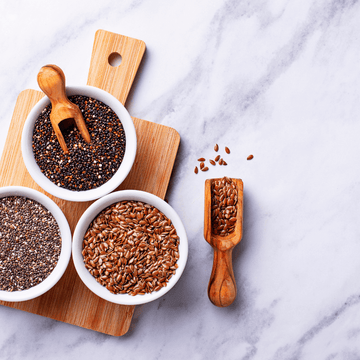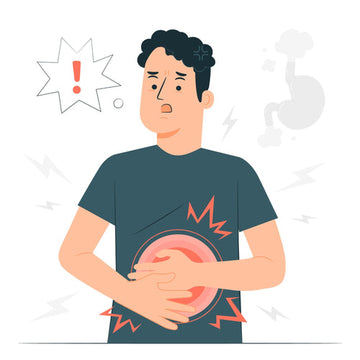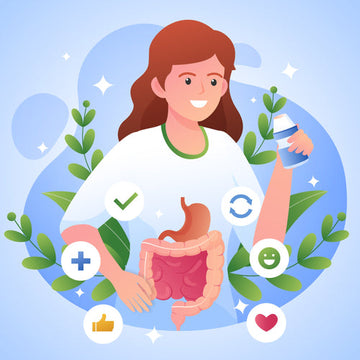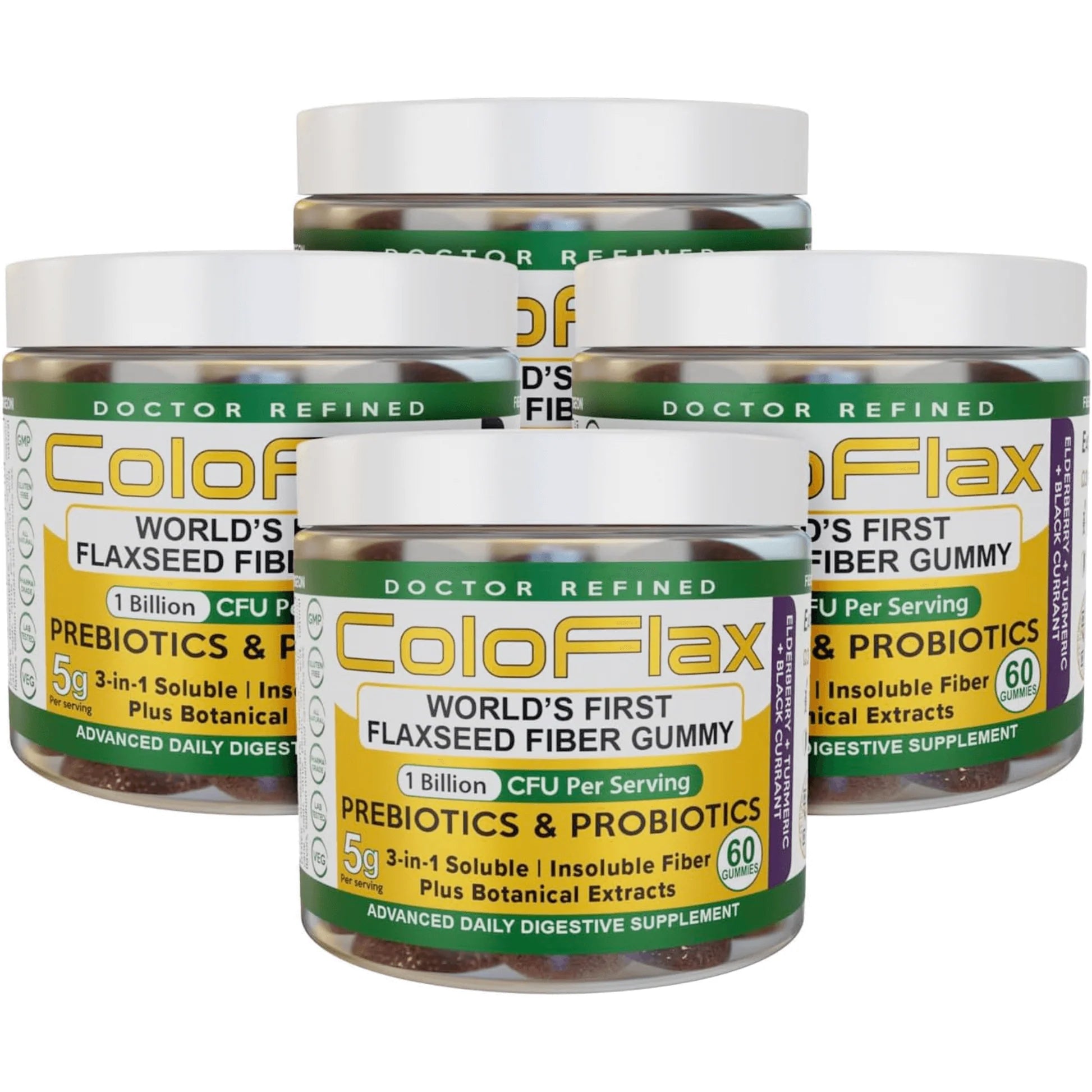Seeds are an important part of a balanced diet. They’re high in fiber, healthy fats, and nutrients. They’re also very versatile and can be eaten as a snack, sprinkled on salads, or added to oatmeal, cereal, and countless other dishes.
But of course, not all seeds are alike, and in the context of nutrient and fat content, some are healthier than others.
Chia seeds, flax seeds, and hemp seeds are usually held up as the healthiest of all seeds, and it’s easy to see why. But how do these seeds compare, and what makes them so healthy?
Macronutrients

Chia, hemp, and flax are all great sources of protein and fiber. More importantly, these seeds contain a blend of soluble and insoluble fiber, a balance of which is needed for optimal digestive health.
Soluble fiber dissolves in water and creates a gelatinous bulk, much like the psyllium husk sachets you can find on the shelves of pharmacies and health food stores. This “bulk” moves slowly through your digestive tract, gathering other waste and making for a more complete and comfortable bowel movement.
Insoluble fiber doesn’t dissolve in water and simply passes through, but it also adds to the bulk of your stool and so it is still very important.
As for protein, it helps with muscle recovery and growth. What’s more, both fiber and protein can make you feel fuller for longer, so it goes without saying that foods with both fiber and protein are beneficial if you’re trying to lose weight.
- Hemp Seeds
- Calories = 160
- Protein = 9.5g
- Fiber = 2g
- Chia Seeds
- Calories = 140
- Protein = 4.7g
- Fiber = 10g
- Flaxseed
- Calories = 160
- Protein = 9.5g
- Fiber = 5g
All of these seeds are fantastic for increasing your fiber and protein intake. Chia is a little better on the fiber side of things, but it also contains the least amount of protein.
For balance, we’d probably pick flaxseed, especially as 9.5g of fiber is incredibly high for a 160-calorie serving of a plant-based food.
Amino Acids

The protein value of a foodstuff is dependent on its amino acid profile. These are the building blocks of life, and the best proteins contain a blend of all amino acids.
Such is the case with hemp seeds, which are considered a “complete protein” and share a profile similar to that of egg whites. However, the quality of the seeds varies, and some studies suggest that certain hemp seeds have very little lysine, which is an essential amino acid.
Flax seeds are also low in lysine, so they are not considered to be a complete protein. However, they are high in other amino acids, including arginine and glutamic acid.
As for chia seeds, they are a complete protein, although as noted above, they have much less protein than hemp seeds and flax seeds.
Fatty Acids

Omega-3 and omega-6 fatty acids have been linked to a variety of health benefits. They support digestive health, heart health, joint health, and even cognition.
Fish is one of the most common sources of omega-3 fatty acids. It’s also one of the best. But that doesn’t help you if you’re vegan or vegetarian.
These seeds prove that you don’t need to eat fish to consume essential fatty acids.
Of the three seeds mentioned here, chia has the highest concentration of omega-3 fatty acids, but only just.
There is around 2,400mg omega-3 and 800mg omega-6 in a single tablespoon of chia seeds. This compares to 2,300mg and 600mg respectively for flaxseed. These numbers are very high and the difference is marginal, so both are great options.
As for hemp seeds, they fall a little short.
Hemp contains around 1,000mg of omega-3 per tablespoon, along with 2,500mg of omega-6. Although still beneficial, many experts argue that the modern diet is too imbalanced when it comes to omega-6 and omega-3.
The ideal range falls somewhere between 4:1, which means you should eat a gram of omega-3 for every 4 grams of omega-6. Hemp seeds still fit into that ratio, but as the rest of your diet may heavily lean toward omega-6, it’s best to consume foods that are much higher in omega-3.
In general, seeds are a great source of healthy fats. Over the last few decades, fat has been demonized and linked to everything from the obesity epidemic to liver and heart disease. But while trans fats and saturated fats are detrimental to your health, monounsaturated and polyunsaturated fats are loaded with health benefits.
These are the types of fats you will find in seeds, so you can enjoy them without worrying about any ill effects.
Vitamins and Minerals

Hemp seeds provide between 20% and 50% of your daily recommended intake of magnesium, phosphorus, manganese, and copper. These minerals play an important role in many different bodily processes.
Chia seeds and flax seeds are also good sources of minerals, with smaller amounts of iron, selenium, and zinc, but they fall a little short.
As for vitamins, chia/flax/hemp are a source of B vitamins, but their main nutrients come from minerals.
Antioxidants

All seeds contain antioxidants. These free radical-fighting compounds can combat oxidative stress and may support everything from immune and digestive health to cardiovascular health.
When it comes to antioxidants, the spotlight usually shines on flaxseed, and not without reason. It all comes down to something known as lignans, of which flax seed is one of the best sources.
Lignans are types of nutrients known as phytoestrogens. They can support blood, heart, and digestive health, and have been the subject of countless great studies.
This is one of the reasons we included flaxseed in our one-serving-a-day fiber gummy, but it also helps that flaxseed is a fantastic source of antioxidants, soluble fiber, and other beneficial ingredients.
Taste and Variety

All of these seeds have a unique flavor and we can’t tell you which is best in that department.
What we will say, however, is that chia seeds have a much milder flavor and are probably the least suitable for eating on their own. Hemp seeds are also best when they have been hulled, although that depends on personal preference.
Flaxseeds are arguably the strongest in flavor. They have an earthy taste when eaten raw but develop a unique nuttiness when toasted.
In terms of variety, all of these seeds can be added to a range of sweet and savory dishes.
Chia seeds work well in oat and milk-based desserts and breakfast foods. They soak up liquid and create a gelatinous texture. They are also very filling, as they expand in the stomach.
Flaxseeds are best in savory dishes after a light toasting, but they go create with oatmeal. As for hemp seeds, they are usually best in savory dishes.
Price

Chia seeds, flax seeds, and hemp seeds are all very cheap. You can buy a month’s supply for just a few bucks. Flaxseed is by far the cheapest option, though, with hemp usually costing the most.
On a per-tablespoon basis, flaxseed costs around 6 cents, compared to between 25 and 30 cents for hemp and chia. They are all affordable, especially when you consider that you’ll likely consume less than 2 tablespoons a day, but if cost is a consideration, flax is the way to go.
Seeds are superfoods, and they’re much cheaper than punnets of fresh blueberries or tubs of green superfood powder.
The Downsides

There are a few things you need to be aware of when it comes to eating chia, flax, or hemp seeds.
The first is that it’s possible to be allergic to these seeds. The same is true for many different foods, and if you experience any issues, you should stop eating them and consult with a medical professional.
Allergies aside, there are very few issues, but chia seeds can be more of a choking hazard than other seeds. The fact that they swell in size means they could lodge in your throat.
To counteract this, many people choose to presoak them for 10 to 15 minutes. This means that they take on water before they are consumed, leaving little room for nasty surprises. You should have the same issue with flax seeds or hemp seeds, as they are very small and don’t increase in size.
Finally, as there is a lot of fiber in seeds, eating large quantities of them could cause temporary bloating, gas, and digestive distress. This is true any time you greatly increase the amount of fiber in your diet, and it’s more of an issue if you’re switching from a diet with very little fiber.
What about Other Types of Seeds?

We chose flax seeds, chia seeds, and hemp seeds for this article as they are some of the healthiest seeds that you can buy. But that’s a pretty subjective statement and most seeds are good for you. In fact, if you’re looking for specific benefits or nutrients, these three might not even be the best options.
Here are a few other healthy seeds to consider adding to your diet:
- Sesame Seeds: More protein than fiber, lots of copper, and high lignan content. They’re also delicious and nutty.
- Pumpkin Seeds: A tasty snack that contains 7g of protein for a 1-ounce serving. Pumpkin seeds are also high in magnesium, phosphorus, and manganese, as well as omega 6.
- Sunflower Seeds: These seeds are high in vitamin E and contain about 6 grams of protein per 1-ounce serving.
- Poppy Seeds: A great option for budding bakers, poppy seeds contain a high concentration of manganese, as well as over 5g of both protein and fiber per ounce. Just stay clear if you are regularly drug tested as they can trigger false positives for opioids.
Summary: Flaxseed vs Chia Seed vs Hemp Seed
All the seeds discussed in this article are healthy, nutritious, and easy to add to your diet. Obviously, we have a preference for flaxseed—that’s why we used it in our gummy and it’s why we have written about it so much (including this guide to the benefits of flaxseed). However, most Americans can benefit from eating more seeds in general.
Seeds are a fantastic source of healthy fats and include a good balance of protein and fiber, as well as lots of antioxidants and minerals. Adding a spoonful of seeds to your daily diet could support digestive health and heart health while helping you to maintain a healthy weight.
They’re also cheap, delicious, and versatile. So, the next time you’re at the grocery store, be sure to check out their selection of seeds.






